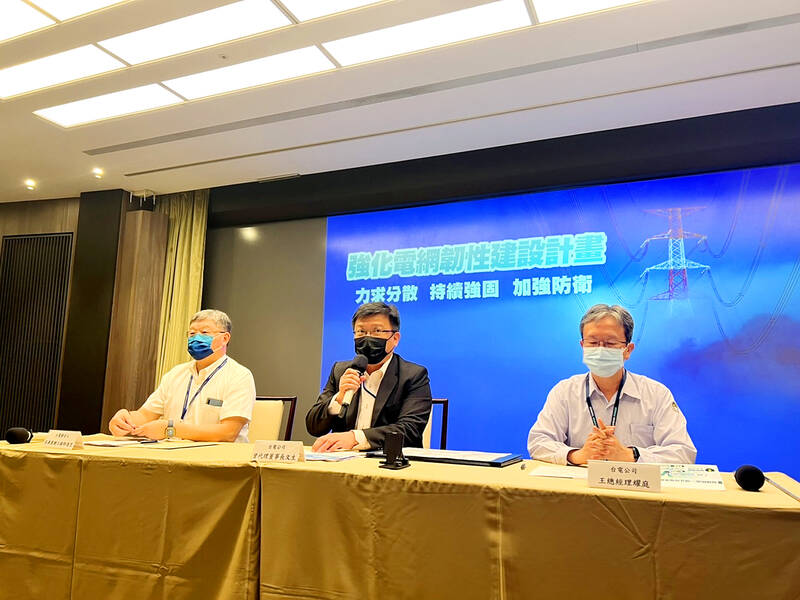Taiwan Power Co (Taipower, 台電) yesterday unveiled plans to invest NT$564.5 billion (US$18.13 billion) over the next 10 years to enhance the resilience and reliability of its power grids, in a bid to prevent massive outages from affecting industrial production and people’s lives.
The power grid enhancement plan, the largest in the company’s history, came amid growing concern about the state utility’s ability to maintain stable electricity supply after a large-scale blackout in March affected 5.49 million households and halted the operations of semiconductor, cement and petrochemical plants, mostly in Kaohsiung and adjacent areas.
That is aside from the frequent and smaller power interruptions that struck households, stores and factories over the past one to two years due to equipment malfunction or human error.

Photo: Ching Lin, Taipei Times
“The new project aims to enhance power grid resilience by deploying microgrids, rather than relying on major grids for electricity supply,” Taipower acting chairman Tseng Wen-sheng (曾文生) told a media briefing.
The multiple dispersed power generation sources and transmission channels would reduce the frequencies of major blackouts as the damage can be better controlled within a region, Taipower president Wang Yao-ting (王耀庭) said.
The large-scale outage in March was an example. The blackout was caused by a switch malfunction at Kaohsiung’s Hsinta Power Plant (興達電廠), which took the facility offline and led to a circuit malfunction at the Longqi Extra High Voltage Substation (龍崎超高壓變電所), causing several power plants in the south to shut down.
To prevent such ripple effects, Taipower plans to reduce interregional power supply by adjusting power allocation and deploying dedicated microgrids to transmit power directly to industrial users in major science parks, Wang said.
Taipower plans to transmit electricity to industrial users in the Hsinchu Science Park from the Tunghsiao Power Plant (通霄電廠) in Miaoli County, while the Taichung Power Plant (台中電廠) would serve users in the Central Taiwan Science Park.
The Hsinta Power Plant will supply power to companies in the Southeastern Taiwan Science Park, while the Datan Power Plant (大潭電廠) will be responsible for users in Taoyuan and New Taipei City industrial parks, the company said.
Those regional grids would also provide a pathway to switch to renewable energy, such as wind and solar power, Wang said.
To provide stable power supply, Taipower plans to add about 52 new and revamped substations, mostly indoor facilities within the next 10 years.
The company plans to upgrade substations and power transmission systems more regularly to boost their reliability, its said.
The Cabinet has approved a capital injection of NT$150 billion for Taipower next year to fund the project, Tseng said.

Intel Corp chief executive officer Lip-Bu Tan (陳立武) is expected to meet with Taiwanese suppliers next month in conjunction with the opening of the Computex Taipei trade show, supply chain sources said on Monday. The visit, the first for Tan to Taiwan since assuming his new post last month, would be aimed at enhancing Intel’s ties with suppliers in Taiwan as he attempts to help turn around the struggling US chipmaker, the sources said. Tan is to hold a banquet to celebrate Intel’s 40-year presence in Taiwan before Computex opens on May 20 and invite dozens of Taiwanese suppliers to exchange views

Application-specific integrated circuit designer Faraday Technology Corp (智原) yesterday said that although revenue this quarter would decline 30 percent from last quarter, it retained its full-year forecast of revenue growth of 100 percent. The company attributed the quarterly drop to a slowdown in customers’ production of chips using Faraday’s advanced packaging technology. The company is still confident about its revenue growth this year, given its strong “design-win” — or the projects it won to help customers design their chips, Faraday president Steve Wang (王國雍) told an online earnings conference. “The design-win this year is better than we expected. We believe we will win

Chizuko Kimura has become the first female sushi chef in the world to win a Michelin star, fulfilling a promise she made to her dying husband to continue his legacy. The 54-year-old Japanese chef regained the Michelin star her late husband, Shunei Kimura, won three years ago for their Sushi Shunei restaurant in Paris. For Shunei Kimura, the star was a dream come true. However, the joy was short-lived. He died from cancer just three months later in June 2022. He was 65. The following year, the restaurant in the heart of Montmartre lost its star rating. Chizuko Kimura insisted that the new star is still down

While China’s leaders use their economic and political might to fight US President Donald Trump’s trade war “to the end,” its army of social media soldiers are embarking on a more humorous campaign online. Trump’s tariff blitz has seen Washington and Beijing impose eye-watering duties on imports from the other, fanning a standoff between the economic superpowers that has sparked global recession fears and sent markets into a tailspin. Trump says his policy is a response to years of being “ripped off” by other countries and aims to bring manufacturing to the US, forcing companies to employ US workers. However, China’s online warriors